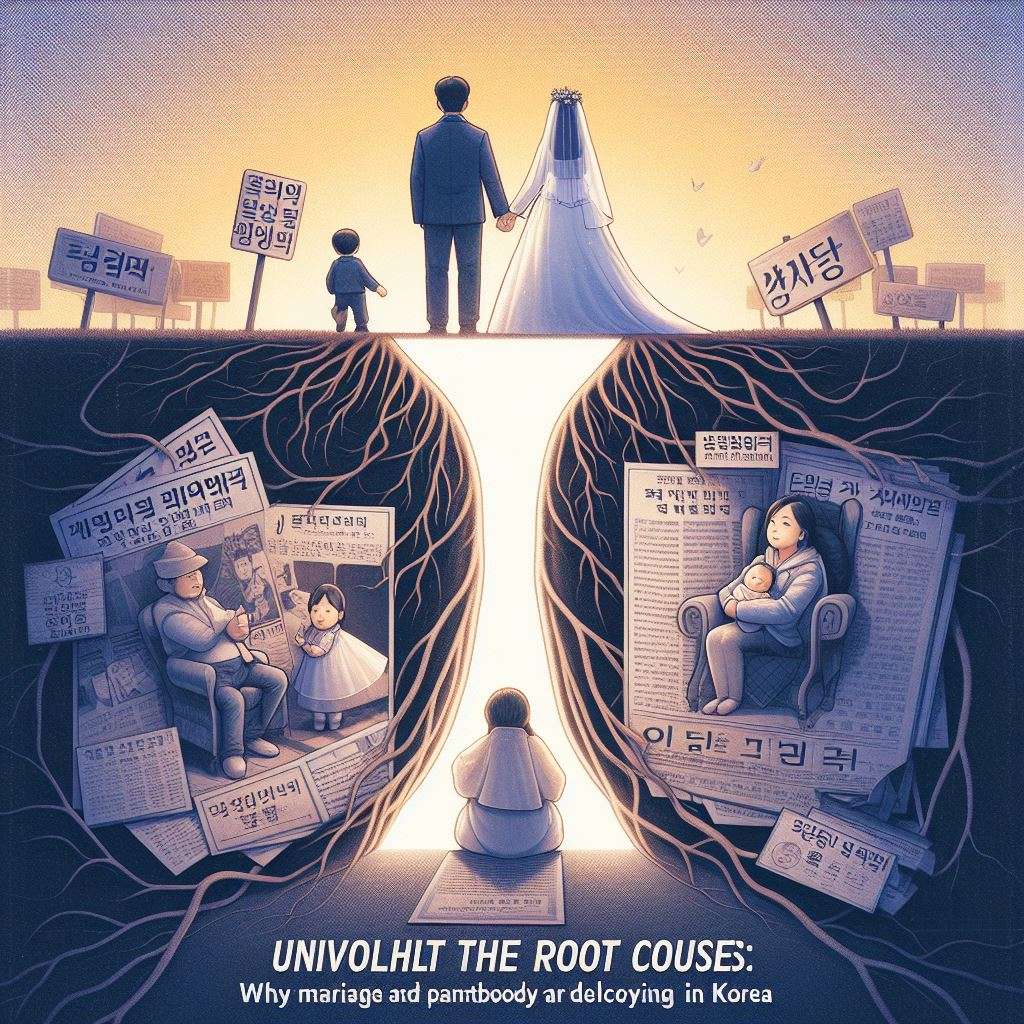su_note note_color=”#f8f8f0″ radius=”7″]The decline in marriage and parenthood rates in South Korea is a multifaceted issue, reflecting deep-rooted societal, economic, and cultural transformations. Understanding these changes is crucial, not only for those living in Korea but also for observers and policymakers. Here, we delve into the primary causes driving this trend, providing a comprehensive analysis of each factor.[[/su_note]

Korea Economic Challenges
1. High Cost of Living and Housing Prices
- Skyrocketing Real Estate Prices: In major cities like Seoul, the cost of housing has reached staggering levels, making it difficult for young couples to afford a home.
- Living Expenses: The general cost of living, including expenses for education, healthcare, and daily necessities, adds significant financial pressure.
2. Job Market Instability
- Youth Unemployment: There’s a high rate of unemployment among young adults, which creates insecurity and reluctance to commit to long-term plans like marriage or starting a family.
- Job Precarity: Many young Koreans are engaged in temporary or part-time employment, lacking the stability and benefits of full-time positions.
Korea Societal and Cultural Shifts
3. Changing Perceptions of Marriage and Family
- Individualism Over Collectivism: Younger generations prioritize personal fulfillment and career aspirations over traditional family roles.
- Gender Roles and Expectations: There’s a shift in how gender roles are perceived, with more women focusing on their careers and personal growth, leading to a change in attitudes towards marriage and motherhood.
4. Educational and Career Aspirations
- Higher Education Pursuits: With a high emphasis on education, many young Koreans spend their 20s in academic pursuits, delaying marriage and family planning.
- Career Development: Career ambitions and the competitive job market lead to delayed marriages, as individuals focus on establishing themselves professionally.
Governmental and Policy Factors
5. Childcare and Parenting Support
- Lack of Adequate Childcare Facilities: The shortage of affordable and quality childcare options is a deterrent for parents.
- Work-Life Balance Challenges: The demanding work culture in Korea often leaves little room for family life, discouraging parenthood.
6. Ineffective Government Policies
- Policies Not Meeting Needs: Government efforts to reverse the trend have often been criticized for not adequately addressing the underlying issues.
- Lack of Long-Term Solutions: Many policies offer short-term incentives without tackling the root causes, such as high housing costs and job instability.
Health and Wellbeing Concerns
7. Mental Health and Stress
- Societal Pressure and Stress: The pressure to conform to societal expectations regarding marriage and parenthood can lead to stress and mental health issues.
- Financial Burdens: The economic pressures associated with raising a family contribute to mental health concerns, making the decision to have children more daunting.
8. Physical Health Considerations
Delayed Parenthood: Due to various factors, many couples are opting to have children later in life, which can sometimes lead to difficulties in conception.
Global Influences and Comparisons
9. Influence of Western Lifestyles
- Globalization: Exposure to Western lifestyles and values through media and travel has influenced Korean perceptions of family and personal freedom.
- Comparative Analysis with Other Countries: Observing trends in countries with similar economic development, such as Japan, where similar declines in marriage and parenthood rates are evident, offers valuable comparative insights.
10. International Economic Trends
- Global Economic Shifts: International economic conditions, such as the rise of the gig economy and digital nomad lifestyles, influence employment and life choices in Korea.
- Cross-Cultural Exchanges: Increased cross-cultural interactions have introduced diverse perspectives on life choices, impacting traditional views on marriage and parenthood.
Technological Advancements and Lifestyle Changes
11. Impact of Digital Technology
- Online Socialization: The rise of digital communication platforms has altered social interactions, potentially impacting the way relationships and family units are formed.
- Technology and Work-Life Balance: Technological advancements have changed work patterns, with remote work and flexible hours influencing decisions about family life.
12. Urbanization and Lifestyle Choices
- Shift from Rural to Urban Living: The migration towards urban areas for better job opportunities has impacted traditional family structures and support systems.
- Changing Lifestyle Preferences: There’s a growing preference for travel, personal hobbies, and experiences over the traditional path of marriage and child-rearing.
The Role of Education and Awareness
13. Educational Reforms and Awareness
- Sex Education and Family Planning: Enhanced education around family planning and reproductive health can impact decisions regarding parenthood.
- Awareness Campaigns: Raising awareness about the societal and economic benefits of balanced work-life integration could encourage more family-friendly practices.
14. Cultural Dialogue and Sensitivities
- Promoting Cultural Understanding: Encouraging open dialogues about changing family dynamics and societal expectations can lead to a more inclusive understanding of individual choices.
- Respecting Personal Decisions: Emphasizing the importance of respecting personal decisions regarding marriage and parenthood in a rapidly changing society.
Conclusion and Future Outlook
The decline in marriage and parenthood rates in South Korea is a complex issue, intertwined with economic, societal, cultural, and technological factors. It’s not just a question of individual choices but a reflection of broader societal transformations. Addressing these challenges requires a multifaceted approach, involving policy changes, societal shifts, and increased awareness and education. The future of family dynamics in Korea will likely continue to evolve, influenced by both domestic developments and global trends.
Delving into Korean Cuisine: Foods That Fuel the Soul
Hi, I’m [jeybee]. As a long-time resident of Seoul, I’m passionate about uncovering the authentic, everyday magic of Korea. This blog is my way of sharing my favorite spots, tips, and cultural insights with you, beyond the usual tourist traps.

